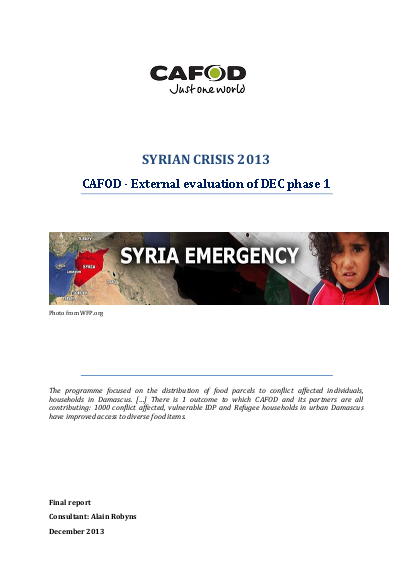
Since 2011, the civil conflict in Syria has resulted in significant humanitarian needs. According to the revised humanitarian assistance response plan for Syria, 4.8 million people, including 4.25 million internally displaced people across the country, are in need of assistance.1 Damascus city has not been immune to conflict: fighting is taking place in the suburbs and even approaching the heart of the city. Hundreds of thousands of people have been affected.
The Disasters Emergency Committee (DEC) appeal was launched on 21 March 2013. CAFOD received £239,293 in funds from the appeal for the Syrian crisis, and undertook to plan and implement a response for the period 1 April to 30 September 2013 in partnership with two church organizations: the lead agency, Partner A based in Lebanon and the implementing agency, Partner B, based in Damascus. The project targeted 1,000 conflict-affected, vulnerable IDP and Refugee households in urban Damascus to improve their access to diverse food items.
The DEC project was deemed to be very effective, taking into account all the challenges of working in the Syrian context, in particular access restrictions due to insecurity, and the lack of experience and capacity of national organizations to respond to emergencies. Building the response on the existing church network and partnership was the key to success. The project partner, Partner B, faced the incredible challenge of shifting from a traditional social assistance model to a more professional and responsive working approach, incorporating increased resources and responding to the management requirements of institutional donors. This could only be achieved thanks to the lead partner (Partner A) who provided the necessary technical assistance and capacity building.
The DEC project was also an opportunity to gain and benefit from experiences and the ‘lessons learned’ (L/L) workshop which took place in November 2013. This has been clearly highlighted in the evaluation report, together with recommendations that address project weaknesses identified during the review process.
